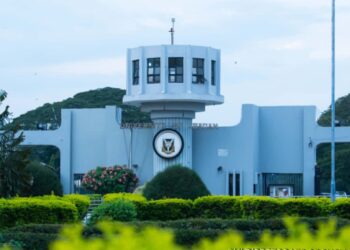The suspended Acting Chairman of the Economic and Financial Crimes Commission (EFCC), Mr Ibrahim Magu, has asked the Judicial Commission of Inquiry on the anti-graft agency to allow him access to all petitions against him.
Magu is seeking to be allowed to examine materials, exhibits and case files ahead of his defence.
He said he decided to table the four requests in view of the timeline given to the commission.
He said the only way he could get a fair hearing is when the relevant documents are made available to him.
In an August 20, 2020 letter to the commission, which is headed by Justice Isa Ayo Salami, Magu said he made the demands in line with Section 36(6) (a) (b) of the Constitution of the Federal Republic of Nigeria.
There were indications that Magu might be directed to open his defence next week.
The letter was sent through his counsel, Mr Wahab Shittu, who claimed that the constitution says a Nigerian accused of the criminal offence be given adequate time and facility for the preparation of his defence.
The petition: “Please refer to Section 36(6) (a) (b) CFRN 1999 which provides as follows ”Every person who is charged with a criminal offence shall be entitled to (a) be informed promptly in the language that he understands and in details of the nature of the offence; (b) be given adequate time and facility for the preparation of his defence.
“Based on the foregoing we request ahead of the defence of our client before this judicial commission of inquiry for the following:
*Copies of all presentations/petitions against our client tendered in these proceedings
*Access to all exhibits tendered in these proceedings
*Access to relevant case files and documents tendered In these proceedings
*Any other materials that will be relevant for purposes of the defence of our client in these proceedings.
“Please note that the foregoing request has become urgent and compelling in view of paragraph 5 of the instrument establishing this judicial commission of inquiry which provides as follows
“AND I hereby direct the Judicial Commission to submit its interim reports to me from time to time, but the judicial commission shall, In any case, submit its final report not later than forty-five days from the date of its first public sitting or within such extended period as may be authorized by me in writing”
Magu added: “We humbly request you to note that in view of the timeline stipulated above and the need to clarify the duration of the sittings and whether the appointing authority has extended the period, it is of utmost importance that access to the requested documents is granted to our client and his counsel to ensure seamless proceedings and the guarantee of fair hearing as enshrined in the 1999 constitution of the federal republic of Nigeria.
“In spite of the foregoing, as officers in the temple of justice, we owe it a duty to reaffirm the contents of our previous letters on the legality of these proceedings and to further draw attention to the following, in the belief that having offered our principled positions on the issues, the judicial commission of inquiry will then be entitled to determine how to proceed subsequently in its absolute discretions.
He pleaded with the commission to take notice of its powers in the Tribunals of Inquiry Act 2004, especially it’s right to exercise of judicial powers.
He said: “We observe that this judicial commission of inquiry is headed by His Lordship, who is a respected former President of the Court of Appeal (Retired). We also observe that contrary to earlier understanding, this is not just an administrative or investigative panel but a Judicial Commission of Inquiry entitled to exercise full judicial powers as a tribunal deriving its powers and authority from the Tribunals of Inquiry Act 2004.
”Against this background, we draw attention to Section (6) (1-5) and Part IV (interpretation citation and commencement) provisions of the constitution particularly Section 318(1) thereof providing for the exercise of judicial powers by courts and tribunals and the meaning of “judicial office and the judicial officer” as stated therein
“It Is Important to note that Judicial officer is a reference to the holder of any such office while “judicial office” means “the office of Chief Justice of Nigeria or a Justice of the Supreme Court, the President or Justice of the Court of Appeal, the office of the chief judge or a judge of the federal high court, the office of the chief judge or judge of the high court of the Federal Capital Territory, Abuja, the office of the Chief Judge of a state and Judge of the high court of a state, a Grand Khadi or Khadi of a Sharia Court of Appeal of the Federal Capital Territory, Abuja, a President or Judge of the Customary Court of Appeal of the Federal Capital Territory Abuja, a Grand Khadi or Khadi of the Sharia Court of Appeal of a state, or president or a judge of the Customary Court of Appeal of a state; and a reference to a “judicial officer” is a reference to the holder of any such office.
”In view of the foregoing and the status of His Lordship as a retired judicial officer heading this judicial commission of inquiry, we draw attention to this constitutional provision so that same can be taken on board by the honourable members as reflections on the legality of these proceedings and the determination on how to further proceed in the circumstances.
”Having raised this important constitutional provision, our duty as counsel is done. Please accept our best professional regards in the expectation that all of these issues will be reflected upon and our request for materials in aid of our defence graciously granted.









